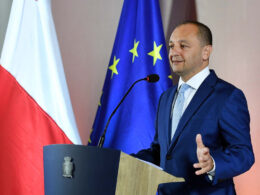The latest MaltaToday survey delivers a sobering message to the PL: despite facing an opposition with an underperforming leader in Bernard Grech, the PN now leads by a striking 12,000 votes. This figure should send alarm bells ringing in the corridors of Castille. Disillusionment within the electorate has been growing, with both recent surveys and independent analyses, such as those by statistician Vincent Marmara, indicating a shifting tide that the Labour leadership can no longer afford to ignore. The question remains, can a simple reshuffling of deputy leaders remedy a party that seems increasingly out of touch with its base?
A Trust Deficit: Is Money No Longer Enough?
One of the central arguments from Marmara’s analysis of the MaltaToday survey is the growing number of undecided voters within PL’s traditional base. Marmara, a respected statistician and political analyst who runs a research consultancy and has years of experience with electoral studies, has highlighted this in social media commentary. He observes that despite the government’s attempts to appease voters through financial handouts, the electorate’s expectations have evolved. The problem, as Marmara notes, is that these handouts—once sufficient to maintain support—are no longer enough.
The Maltese public, particularly long-time Labour supporters, are increasingly seeking more than just monetary incentives. As several comments on Marmara’s Facebook posts illustrate, there is a rising sentiment that the party’s policies have drifted away from the real concerns of the public. One user, for example, complained that “the government keeps giving money, but we need action on immigration, overpopulation, and traffic, not just cheques.”
Overpopulation and Immigration: A Growing Wound

The issue of immigration and overpopulation has become a major focal point for PL’s dissatisfied voters. Both Marmara’s analysis and the wave of public comments beneath it underscore the frustration many feel about the government’s handling of this issue. The Labour leadership has been criticised for allowing an influx of foreign workers without providing the necessary infrastructure to accommodate them.
One commentator remarked, “The country has become overcrowded with foreigners, and the government is ignoring the cries of the people,” encapsulating the widespread view that the government has been ineffective in managing this crisis. It’s a narrative that Labour leaders can no longer dismiss as fringe, especially as Marmara himself warned that these issues could lead to further alienation of the PL’s core base.
A Stale Strategy: Social Media and the Public Disconnect
Another point raised by both Marmara and various respondents to his posts is the Labour government’s growing reliance on social media to push its narrative. In what appears to be an attempt to deflect criticism, PL leaders have opted to engage more with influencers and social media campaigns than with actual policy-making. As Marmara bluntly stated, “Elections aren’t won by likes but by winning hearts and minds.”
Many commenters echoed this sentiment, criticising the Robert Abela leadership for being more focused on managing its public image than on addressing real issues. “The government is leaving major issues like overpopulation and traffic to be debated on social media, when they should be leading with solutions,” another user lamented.
The use of social media as a primary engagement tool has led to accusations that the government is out of touch with the electorate’s day-to-day realities. Labour’s over-reliance on this approach has also been interpreted as a sign of complacency, feeding the perception that the party is too comfortable in power, despite growing signs of public dissatisfaction.
The Opposition’s Opportunity: A Hollow Victory?
What is perhaps most surprising about the survey results is that the PN’s lead comes in the absence of any major surge in its own popularity. Bernard Grech, the opposition leader, has been widely criticised for his lacklustre performance, and yet his party is ahead by 12,000 votes. Marmara and other political observers agree that this gap is more about Labour’s decline than the PN’s ascent.
In his analysis, Marmara explained that the PN’s current lead is fragile and largely dependent on the electorate’s dissatisfaction with Labour, rather than the opposition presenting itself as a strong alternative. Indeed, the MaltaToday survey confirms that PN voters are more motivated by frustration with the government than by confidence in their own party.
Changing Faces Is Not Enough: A Call for Deeper Reform
In the wake of these troubling signs, the Labour Party recently replaced its deputy leaders. Yet, as many critics have pointed out, merely changing personnel won’t be enough to reverse the party’s fortunes. Commentators have stressed that a superficial reshuffle without meaningful policy changes will do little to win back disillusioned voters.
Several PL supporters suggested that the leadership must tackle the root issues driving public frustration: corruption, overpopulation, and economic inequality. As one comment pointedly observed, “We need more than just new faces. The party must change its direction or risk losing power.”
The PL leadership needs to make a significant course correction if it hopes to restore the electorate’s confidence. Policies that address the public’s concerns, particularly on issues like immigration, overpopulation, and transparency, are no longer optional—they are essential.
Time for a Radical Reset
The message from both the MaltaToday survey and Marmara’s analysis of the poll is clear: the Labour Party can no longer afford to coast on its past successes. With a growing number of undecided voters and a lead by the opposition, even one as weak as the PN, PL must evolve or face serious consequences in the next election.
Changing the deputy leaders might be a step towards addressing internal dissatisfaction, but unless the party also reforms its policies to reflect the concerns of everyday Maltese citizens, it risks a steady decline that even social media campaigns cannot reverse.








